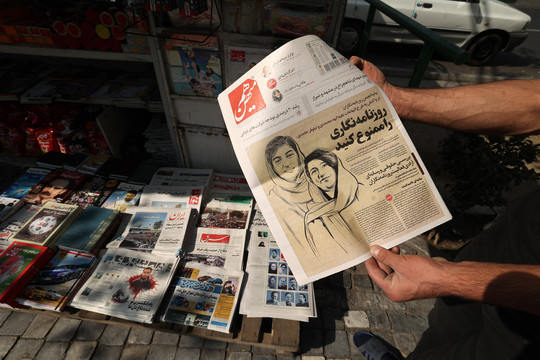Niloofar Hamedi, who reported from the hospital where Mahsa Amini was admitted before she was pronounced dead, and Elahe Mohammadi, who covered Amini’s funeral in the city of Saqqez, were accused by the Iranian authorities in a statement released on October 31.
Hamedi and Mohammadi, who have been held in Evin prison for more than a month, have been accused of being “primary sources of news for foreign media”. The official statement accuses them of using their journalistic activity as a cover to spark demonstrations against the government. Spying charges carry the death penalty in Iran.
According to the narrative of the Iranian authorities, protests in the country were planned by the CIA, Mossad and other western intelligence agencies.
Ongoing national protests started in Iran after the death of Amini, a 22 year-old woman who was arrested in Tehran by the Morality Police for wearing her hijab incorrectly and died while in the custody of the Iranian authorities on September 16.
The Tehran Province Journalists Association (TPJA) published a statement and sent a letter to the head of the Iranian judiciary, condemning the deliberate targeting of the two journalists. “The joint statement of the country's two main intelligence institutions about the analysis of recent events had no content except that journalism should be declared a crime and prohibited because the normal activity of two of our colleagues in performing their professional duties has been cited as an accusation that means the end of journalism", reads the statement.
TPJA has warned the unfounded accusations will have a chilling effect on journalists and media in the country.
IFJ General Secretary Anthony Bellanger said: “We strongly condemn the unfounded accusations against our colleagues, who did nothing more than performing the most basic principles of reporting: going to the scene of the event and informing the public about what happened. We urge the Iranian authorities to drop the accusations against Hamedi and Mohammadi, and renew our call for the immediate release of all journalists detained”.
Journalists in jail since the start of the protests
1- Mrs Yalda Moayeri, freelance news photographer and award-winning photographer
2- Mrs Nilofar Hamedi, a journalist at Shargh newspaper
3- Mrs Elahe Mohammadi, a journalist at Hammihan newspaper
4- Mrs Fatemeh Rajabi, Haft Sobh newspaper and Boursan website journalist
5- Mr Mojtaba Rahimi, freelance journalist
6- Mr Alireza Khoshbakht, freelance journalist
7- Mr Rouholah Nakhaei, freelance journalist
8- Mr Masoud Kordpur, editor at Mukrian news agency
9 - Mr Alireza Jabari Darestani, Journalist at Mehr news agency
10- Mr Iman Beh Pasand, freelance journalist
11- Mrs Vida Rabani, freelance journalist at Shargh newspaper
12- Mrs Samira Alinejad, journalist at Kerman no news website
13- Mrs Mehrnoush Tafian, local freelance journalist
14- Mr Farshid Ghorbanpour, Journalist at Haft Sobh newspaper
15 - Mr Arya Jafari, a photojournalist at ISNA news agency in Isfahan
16 - Mr Sivash Soleimani, a veteran journalist at Urmia city
17- Mr Fardin Kamangar, veteran journalist at Sanandaj city
18- Mr Ehsan Pirbarnash, sports journalist in Tehran
19- Mrs Saide Fathi, Sports journalist at Tehran
20- Mr Vahid Shamsoldinnejad, Arte news channel journalist
21- Mrs Marzieh Amiri, journalist at Shargh newspaper
22- Mrs Nazila Maroofian, journalist at Dideban Iran website and Rouydad24 website
Journalists that were in jail before the start of the protests
23- Mr Keyvan Samimi, veteran journalist and editor-in-chief of Iran Farda magazine
24- Mr Khosro Sadeghi Borojeni, freelance journalist
25- Mr Morteza Haghbaian, freelance journalist
26- Mrs Alie Motalebzadeh, freelance journalist
Journalists arrested during the protest but released afterwards
1- Mr Khosro Kordpur, journalist at Mukrian news agency
2- Mrs Batool Balali, journalist at Kerman Farda news website
3 - Mr Shahram Azmoude, editor-in-chief of Talesh magazine
4 - Mrs Safieh Gharebaghi, freelance journalist at Zanjan city
5 - Mr Ali Salem, the Shargh newspaper journalist
6 - Mr Alborz Nezami, a journalist at Donaye Eghtesad newspapers
7- Mr Ahamd Halabi Saz, freelance news photographer
8- Mrs Bahar Aslani, freelance photographer

